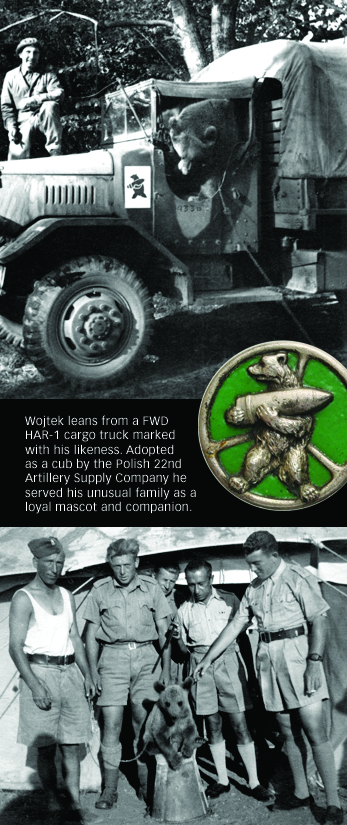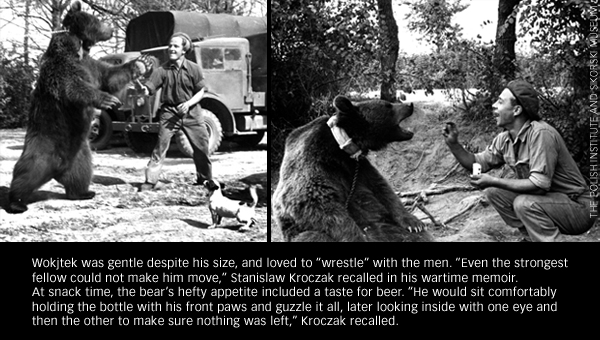 At six feet tall and more than 500 pounds fully grown, the Syrian brown bear known as Wojtek cut an intimidating figure—especially when he took someone by surprise. As Stanislaw Kroczak, a platoon commander with the Polish II Corps’s 22nd Artillery Supply Company, recounts in his memoir, a fellow soldier awoke one night to the feeling of a fearful weight. “Terrified, he saw the open jaws of Wojtek, who was straddling him and making it impossible to make the slightest move,” Kroczak wrote. “After a while someone came into the tent and chased him away.”
At six feet tall and more than 500 pounds fully grown, the Syrian brown bear known as Wojtek cut an intimidating figure—especially when he took someone by surprise. As Stanislaw Kroczak, a platoon commander with the Polish II Corps’s 22nd Artillery Supply Company, recounts in his memoir, a fellow soldier awoke one night to the feeling of a fearful weight. “Terrified, he saw the open jaws of Wojtek, who was straddling him and making it impossible to make the slightest move,” Kroczak wrote. “After a while someone came into the tent and chased him away.”
Not far, though. Wojtek was the company’s beloved mascot, acquired in Iran as a cub in 1942 when II Corps was being assembled to fight the Germans in Italy, under the British Eighth Army. The bear tagged along with the company every step of the way, even joining the troops on the ship that took them from Alexandria, Egypt, to Taranto, Italy. Some accounts say that the Poles skirted a British prohibition against troops bringing animals on board by issuing paperwork declaring Wojtek an official member of the unit.
The most repeated Wojtek story has the bear unloading and hauling ammunition at the 1944 Battle of Monte Cassino; an image of Wojtek holding a shell became the company’s insignia. Kroczak, however, says it didn’t happen; the legend began when the writer of the first popular book about Wojtek “succumbed to a skillfully whispered mischievous joke played on him by soldiers eager to see how much a journalist chasing after a sensational story can be fooled.”
As Kroczak recalled, “There were efforts to teach Wojtek this skill, but he could not grasp an artillery shell, even though he was strong enough. In spite of everything, he was only a bear and not an animal with a near-human intellect.”
Regardless, it’s clear Wojtek was more than just a bear to those who served alongside him. For men and women from a country brutalized by both sides in the war and participating in some of its most vicious battles, Wojtek was comfort, inspiration, and a kindred spirit.





